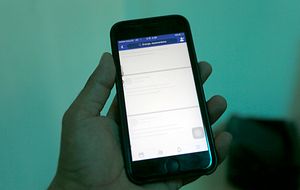Sri Lanka’s government has imposed a nationwide curfew and temporarily blocked social media and messaging apps following a flare-up of communal violence in apparent response to last month’s Easter attacks that killed more than 250 people, officials said Monday.
Army Commander Mahesh Senanayake said in a televised statement that drunken mobs were creating violence and warned people to stay indoors. He did not give any details.
Police said the curfew would be enforced until further notice in the country’s North Western region, and until Tuesday morning in the rest of the nation.
Tensions have been running high in the Buddhist-majority Indian Ocean island nation since the attacks by seven suicide bombers who struck two Catholic and one Protestant church and three luxury hotels. The Islamic State group claimed responsibility for the attacks, carried out by a local radicalized Muslim group.
Muslims have been subjected to hate comments since the Easter Sunday bombings.
The government imposed the social media ban after an exchange of accusations between two people on Facebook led to a mob to attack a Muslim-owned shop Sunday in the Catholic-majority town of Chilaw, said Nalaka Kaluwewa, the chief of the Information Department.
Kaluwewa said the government took the step “to prevent misinformation from being circulated and also to prevent spreading of information that would harm communal harmony.”
Previous blocks on social media and messaging apps imposed following the April 21 suicide attacks on churches and hotels were lifted after several days.
Police spokesman Ruwan Gunasekara said police have arrested a 38-year-old Muslim businessman, Abdul Hameed Mohamed Hasmar, for allegedly writing the Facebook comments that sparked the violence.
Local media reported that residents in the area angered by the comments stoned Hasmar’s shop.
Since then, the government has intensified security across the country, with armed policemen and troops being deployed to protect schools, churches and key government offices.
On Sunday, the Catholic Church held the first regular Sunday Mass since the attacks amid tight security. Sunday services had been canceled the two previous weekends for fear of more attacks, leaving the faithful to hear Mass via live TV transmission from the residence of Cardinal Malcolm Ranjith, the archbishop of Colombo.
Since the end of its 25-year-long civil war in 2009, Sri Lanka’s various minority communities have sought reconciliation, but international observers have underscored that much remains to be done.
By Bharatha Mallawarachi for the Associated Press. Associated Press writer Krishan Francis contributed to this report. Additional reporting by The Diplomat.

































